BusinessEurope Headlines No. 2015-37
TTIP: what’s in it for social partners?
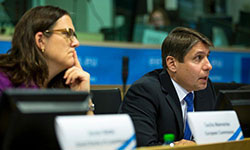 We must seize trade and investment opportunities to make sure the EU stays strong on the world scene and shapes globalisation, BusinessEurope Director General Markus J. Beyrer said at the event “TTIP : what’s in it for social partners?” organised by the European Economic and Social Committee in cooperation with the Luxembourg Presidency. The high-level event on 17 November saw the participation among others of the President of the European Parliament Martin Schulz, the Prime Minister of Luxembourg Xavier Bettel, European Commissioner Cecilia Malsmtröm and EP INTA Chairman Bernd Lange. The EU and the USA are strategic partners sharing many important values based on democracy, the rule of law and respect of human rights. We have an opportunity to set high-level standards that promote innovation and investment while generating wider and better choice of goods and services. Therefore we expect TTIP to go much beyond any other existing agreement signed by either party and to deliver good results for companies both big and small, consumers and workers.
We must seize trade and investment opportunities to make sure the EU stays strong on the world scene and shapes globalisation, BusinessEurope Director General Markus J. Beyrer said at the event “TTIP : what’s in it for social partners?” organised by the European Economic and Social Committee in cooperation with the Luxembourg Presidency. The high-level event on 17 November saw the participation among others of the President of the European Parliament Martin Schulz, the Prime Minister of Luxembourg Xavier Bettel, European Commissioner Cecilia Malsmtröm and EP INTA Chairman Bernd Lange. The EU and the USA are strategic partners sharing many important values based on democracy, the rule of law and respect of human rights. We have an opportunity to set high-level standards that promote innovation and investment while generating wider and better choice of goods and services. Therefore we expect TTIP to go much beyond any other existing agreement signed by either party and to deliver good results for companies both big and small, consumers and workers.
Contact: Eleonora Catella
Photo copyright: EESC 2015
Companies need an innovation-friendly ecosystem to embrace digital transformation
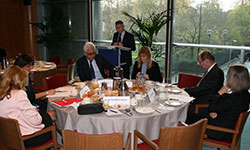 SMEs are still lagging behind in their digital transformation. This challenge needs to be addressed urgently, as digital technology can bring efficiencies to companies and help them take advantage of new opportunities and innovative business models. With this message, Marc Vancoppenolle, Vice-Chair of BusinessEurope digital economy taskforce, expressed the business views at the European Parliament SME Intergroup breakfast on 17 November 2015. Companies, especially SMEs and start-ups, need appropriate financial instruments to embrace technology. Moreover, the EU must provide an innovation-friendly approach to the collection and use of data, which are the foundation of the digital economy. Companies also need robust and well-developed broadband infrastructure in Europe, a precondition for a flourishing digital economy in Europe.
SMEs are still lagging behind in their digital transformation. This challenge needs to be addressed urgently, as digital technology can bring efficiencies to companies and help them take advantage of new opportunities and innovative business models. With this message, Marc Vancoppenolle, Vice-Chair of BusinessEurope digital economy taskforce, expressed the business views at the European Parliament SME Intergroup breakfast on 17 November 2015. Companies, especially SMEs and start-ups, need appropriate financial instruments to embrace technology. Moreover, the EU must provide an innovation-friendly approach to the collection and use of data, which are the foundation of the digital economy. Companies also need robust and well-developed broadband infrastructure in Europe, a precondition for a flourishing digital economy in Europe.
Read more or contact: Daniel Cloquet or Cecilia Zappala
European Parliament hearing on the new trade policy
 BusinessEurope participated in the public hearing to discuss “Trade for All”, the new European Commission communication on trade policy, on 12 November. Commissioner Cecilia Malmström presented the new communication that was followed by a debate with the social partners and academia. Among the points highlighted were: (a) trade policy should remain focused and provide new opportunities for European companies to trade and invest abroad; (b) support the positive steps to adjust trade policy to a new trade and investment reality including the close link between industry and services; (c) the new investment court system proposal can substantially limit the scope of legitimate investment protection for European investors in third countries; (d) actions aimed at furthering sustainability should be on a voluntary basis as they allow for a more flexible approach without jeopardising effectiveness. The European Parliament International Trade Committee will draft an opinion on the communication; the designated rapporteur is Tiziana Beghin, from Movimento Cinque Estelli (Italy).
BusinessEurope participated in the public hearing to discuss “Trade for All”, the new European Commission communication on trade policy, on 12 November. Commissioner Cecilia Malmström presented the new communication that was followed by a debate with the social partners and academia. Among the points highlighted were: (a) trade policy should remain focused and provide new opportunities for European companies to trade and invest abroad; (b) support the positive steps to adjust trade policy to a new trade and investment reality including the close link between industry and services; (c) the new investment court system proposal can substantially limit the scope of legitimate investment protection for European investors in third countries; (d) actions aimed at furthering sustainability should be on a voluntary basis as they allow for a more flexible approach without jeopardising effectiveness. The European Parliament International Trade Committee will draft an opinion on the communication; the designated rapporteur is Tiziana Beghin, from Movimento Cinque Estelli (Italy).
Contact: Luisa Santos
Photo copyright: European Union 2015
Paying taxes is only a fraction of a company’s contribution to society
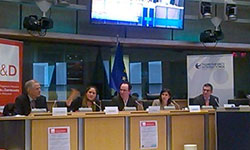 The business community fully supports fair tax competition and the objective to fight fraud and evasion as these create strong competitive distortions at the expense of the vast majority of businesses who pay their taxes in full. Georg Geberth, Director for Global Tax Policy at Siemens and BDI’s representative on BusinessEurope’s tax policy working group, outlined our views at an event on 17 November at the European Parliament on proposals to require companies to disclose tax and financial information on a country-by-country basis. In the context of current discussions, he said, particularly at the European Parliament on corporation tax, we should not lose sight of the essential role companies play in generating growth, creating jobs and foster prosperity for our citizens. Paying taxes is only a fraction of companies’ contribution to society and corporation tax is just a small part of the overall tax paid by businesses. In 2012, businesses paid nearly € 2 trillion of taxes in the EU.
The business community fully supports fair tax competition and the objective to fight fraud and evasion as these create strong competitive distortions at the expense of the vast majority of businesses who pay their taxes in full. Georg Geberth, Director for Global Tax Policy at Siemens and BDI’s representative on BusinessEurope’s tax policy working group, outlined our views at an event on 17 November at the European Parliament on proposals to require companies to disclose tax and financial information on a country-by-country basis. In the context of current discussions, he said, particularly at the European Parliament on corporation tax, we should not lose sight of the essential role companies play in generating growth, creating jobs and foster prosperity for our citizens. Paying taxes is only a fraction of companies’ contribution to society and corporation tax is just a small part of the overall tax paid by businesses. In 2012, businesses paid nearly € 2 trillion of taxes in the EU.
Contact: Mafalda Moz Teixeira
State aid: minimise distortions of competition within the Union while maintaining Europe’s global competiveness
 Europe has a unique system of state aid control, which is one of the cornerstones in safeguarding free and fair competition in the single market. However, as the Chair of BusinessEurope State Aid Working Group Morten Qvist Fog stressed at the ERA annual event on 12 November, we also have to take the global context into account. Global competition should be embraced rather than feared. Very often, the main competitors of European companies come from outside the EU and they are not subject to state aid rules. Therefore, it is important to have an effective state aid control in the EU, but it is also crucial to effectively take on the challenge of globalisation to keep European companies competitive.
Europe has a unique system of state aid control, which is one of the cornerstones in safeguarding free and fair competition in the single market. However, as the Chair of BusinessEurope State Aid Working Group Morten Qvist Fog stressed at the ERA annual event on 12 November, we also have to take the global context into account. Global competition should be embraced rather than feared. Very often, the main competitors of European companies come from outside the EU and they are not subject to state aid rules. Therefore, it is important to have an effective state aid control in the EU, but it is also crucial to effectively take on the challenge of globalisation to keep European companies competitive.
Read more or contact: Guido Lobrano
Calling for a renewed EU SME policy
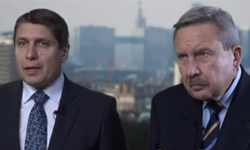 “Businesses ask for a more comprehensive EU SME policy approach” is the core message conveyed in a joint statement published by BusinessEurope and UEAPME on the eve of the European SME Assembly in Luxembourg on 19-20 November. Both organisations support the European Commission’s policy line to integrate SME issues into all EU policies. However, when integrating SME elements into EU policies, the European Commission should rigorously respect its own SME-geared smart regulation principles. Furthermore, the integration of SME elements into EU policies cannot be a substitute for a consistent horizontal EU SME policy, built upon the experience gathered with the Small Business Act, which needs to be reviewed and enhanced.
“Businesses ask for a more comprehensive EU SME policy approach” is the core message conveyed in a joint statement published by BusinessEurope and UEAPME on the eve of the European SME Assembly in Luxembourg on 19-20 November. Both organisations support the European Commission’s policy line to integrate SME issues into all EU policies. However, when integrating SME elements into EU policies, the European Commission should rigorously respect its own SME-geared smart regulation principles. Furthermore, the integration of SME elements into EU policies cannot be a substitute for a consistent horizontal EU SME policy, built upon the experience gathered with the Small Business Act, which needs to be reviewed and enhanced.
Read more, play video or contact: Daniel Cloquet
EU-Japan: what business wants from regulatory cooperation
 The EU and Japan are currently negotiating a comprehensive and ambitious trade and investment agreement, and a large part of the gains will come from addressing non-tariff barriers effectively. Most of the problems faced by companies should be solved by the agreement but new issues might come in the future. Therefore business has a strong interest in a built-in mechanism for regulatory cooperation ensuring that an early warning system is established and that regulators on both sides remain committed even after negotiations are concluded. The concept of a “living agreement” ensures that the benefits are not lost after the entry into force. BusinessEurope stressed this on 16 November at a panel discussion on regulatory cooperation during the 18th EU-Japan conference.
The EU and Japan are currently negotiating a comprehensive and ambitious trade and investment agreement, and a large part of the gains will come from addressing non-tariff barriers effectively. Most of the problems faced by companies should be solved by the agreement but new issues might come in the future. Therefore business has a strong interest in a built-in mechanism for regulatory cooperation ensuring that an early warning system is established and that regulators on both sides remain committed even after negotiations are concluded. The concept of a “living agreement” ensures that the benefits are not lost after the entry into force. BusinessEurope stressed this on 16 November at a panel discussion on regulatory cooperation during the 18th EU-Japan conference.
Contact: Maurice Fermont
Costa Rica: the gateway to Central America
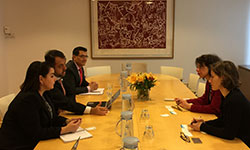 Ways to improve trade and investment between the EU and Costa Rica were discussed at a meeting between BusinessEurope and Alexander Mora, Trade Minister of Costa Rica, on 13 November. The existing EU-Central America free-trade agreement is a good platform to boost business opportunities in the region and Costa Rica is open to serving as a gateway for European companies in Central American countries. BusinessEurope expressed its openness to exchange on a regular basis with Costa Rican authorities on ways of improving business cooperation and take better advantage of the existing free-trade agreement.
Ways to improve trade and investment between the EU and Costa Rica were discussed at a meeting between BusinessEurope and Alexander Mora, Trade Minister of Costa Rica, on 13 November. The existing EU-Central America free-trade agreement is a good platform to boost business opportunities in the region and Costa Rica is open to serving as a gateway for European companies in Central American countries. BusinessEurope expressed its openness to exchange on a regular basis with Costa Rican authorities on ways of improving business cooperation and take better advantage of the existing free-trade agreement.
Contact: Eleonora Catella
Intergovernmental agreements in the field of energy
 In view of the review of the decision on information exchange with regard to intergovernmental agreements in the field of energy by the European Commission, EU businesses are convinced that commercial interests need to be safeguarded. Any revision should be founded on principles of freedom to conduct business, the right of good administration as well as on European law for protection of business secrets. BusinessEurope recently adopted its position on intergovernmental agreements and stresses the role of such agreements in securing access for European businesses to reliable and competitive energy sources. European businesses need a predictable and stable regulatory framework and are confident that existing reporting mechanisms are robust and provide ample opportunities for ex-post assessment of intergovernmental agreements and commercial contracts.
In view of the review of the decision on information exchange with regard to intergovernmental agreements in the field of energy by the European Commission, EU businesses are convinced that commercial interests need to be safeguarded. Any revision should be founded on principles of freedom to conduct business, the right of good administration as well as on European law for protection of business secrets. BusinessEurope recently adopted its position on intergovernmental agreements and stresses the role of such agreements in securing access for European businesses to reliable and competitive energy sources. European businesses need a predictable and stable regulatory framework and are confident that existing reporting mechanisms are robust and provide ample opportunities for ex-post assessment of intergovernmental agreements and commercial contracts.
Read more or contact: Dominik Futschik
Clear and demand-led national frameworks essential for employer engagement in apprenticeships
 Putting clear and demand-led national frameworks in place within which apprenticeship schemes are organised is a crucial part of engaging companies in apprenticeship schemes and increasing the supply of apprenticeship places. This was one of the main conclusions from the last in a series of seminars organised in Madrid with employer representatives from Spain, Portugal and Bulgaria on 12-13 November as part of the BusinessEurope-led project on the cost-effectiveness of apprenticeship schemes. The next phase of the project will be to prepare a final report with the outcomes from the project, which will be presented and discussed at a conference in Brussels in March 2016.
Putting clear and demand-led national frameworks in place within which apprenticeship schemes are organised is a crucial part of engaging companies in apprenticeship schemes and increasing the supply of apprenticeship places. This was one of the main conclusions from the last in a series of seminars organised in Madrid with employer representatives from Spain, Portugal and Bulgaria on 12-13 November as part of the BusinessEurope-led project on the cost-effectiveness of apprenticeship schemes. The next phase of the project will be to prepare a final report with the outcomes from the project, which will be presented and discussed at a conference in Brussels in March 2016.
Contact: Robert Plummer
Calendar
 23 November 2015: meeting of the Eurogroup
23 November 2015: meeting of the Eurogroup- 23-26 November 2015: European Parliament plenary sitting, Strasbourg
- 30 November-1 December 2015: meeting of the Competitiveness Council
- 30 November-11 December 2015: United Nations climate change conference, Paris
Contact: BusinessEurope Headlines